The AMD 2nd Gen Ryzen Deep Dive: The 2700X, 2700, 2600X, and 2600 Tested
by Ian Cutress on April 19, 2018 9:00 AM ESTCPU Office Tests
The office programs we use for benchmarking aren't specific programs per-se, but industry standard tests that hold weight with professionals. The goal of these tests is to use an array of software and techniques that a typical office user might encounter, such as video conferencing, document editing, architectural modelling, and so on and so forth.
All of our benchmark results can also be found in our benchmark engine, Bench.
Chromium Compile (v56)
Our new compilation test uses Windows 10 Pro, VS Community 2015.3 with the Win10 SDK to combile a nightly build of Chromium. We've fixed the test for a build in late March 2017, and we run a fresh full compile in our test. Compilation is the typical example given of a variable threaded workload - some of the compile and linking is linear, whereas other parts are multithreaded.
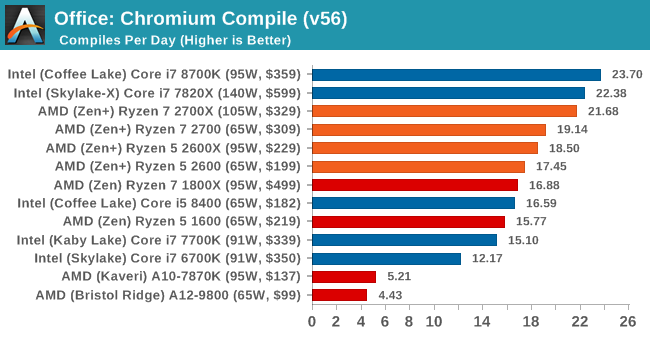
Having redone our compile testing, we can see that the new Ryzen-2000 series parts do provide a good uplift over the first generation, likely due to the decreased cache latencies and better precision boost. Performance per dollar between the 8700K and the 2700X would seem to be about equal as well.
PCMark8: link
Despite originally coming out in 2008/2009, Futuremark has maintained PCMark8 to remain relevant in 2017. On the scale of complicated tasks, PCMark focuses more on the low-to-mid range of professional workloads, making it a good indicator for what people consider 'office' work. We run the benchmark from the commandline in 'conventional' mode, meaning C++ over OpenCL, to remove the graphics card from the equation and focus purely on the CPU. PCMark8 offers Home, Work and Creative workloads, with some software tests shared and others unique to each benchmark set.
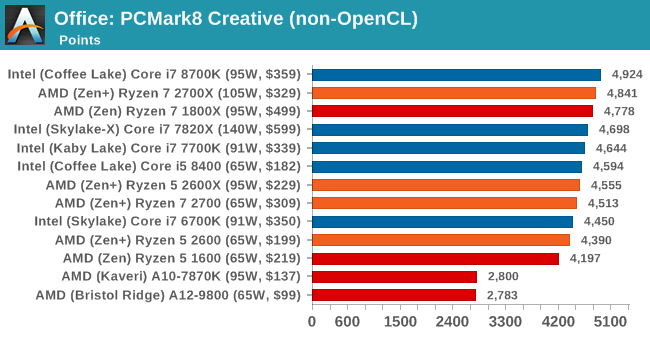
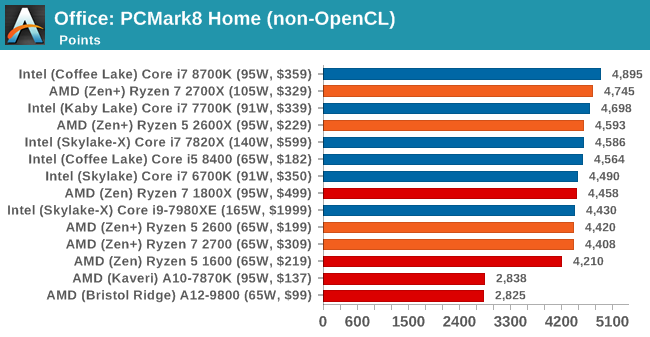

PCMark 10
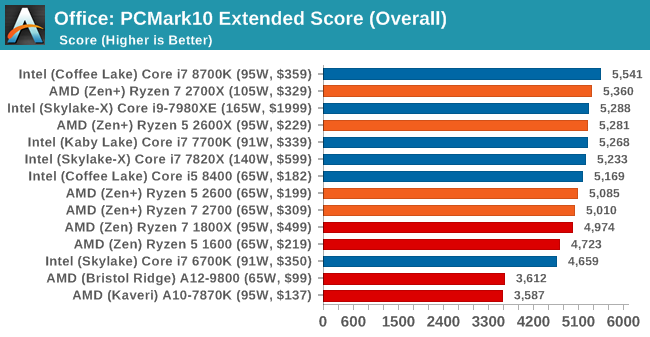
GeekBench4
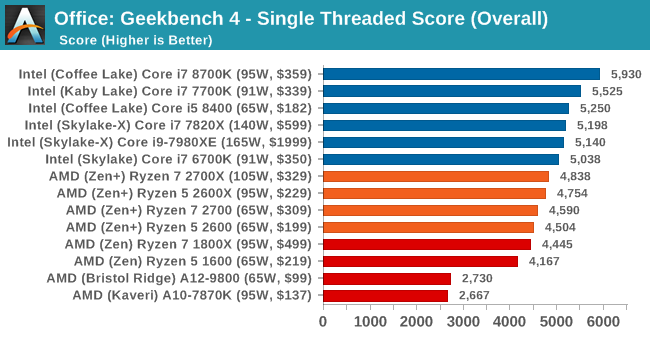
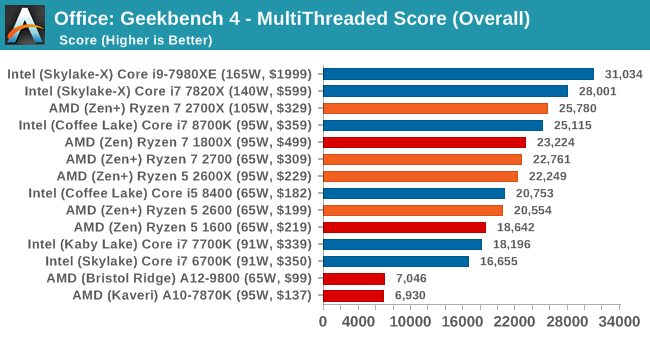
If you live and breathe GeekBench 4, then the single threaded results put Intel firmly in first place. For the multi-threaded tests, the top Intel and AMD mainstream parts are going at it almost neck-and-neck, however it is clear that the previous generation quad-cores are falling behind.










545 Comments
View All Comments
Maxiking - Tuesday, April 24, 2018 - link
"I just finished running Rise of the Tomb Raider benchmarks, 1080p, very high preset, FXAA.Unpatched:
Mountain Peak: 131.48 FPS (min: 81.19 max: 197.02)
Syria: 101.99 FPS (min: 62.73, max: 122.24)
Geothermal Valley: 98.93 FPS (min:76.48, max: 117.00)
Overall score: 111.31 FPS
Windows patch only:
Mountain Peak: 135.34 FPS (min: 38.21 max: 212.84)
Syria: 102.54 FPS (min: 44.22, max: 144.03)
Geothermal Valley: 96.36 FPS (min:41.35, max: 148.46)
Overall score: 111.93 FPS
Windows patch and BIOS update:
Mountain Peak: 134.01 FPS (min: 59.91 max: 216.16)
Syria: 101.68 FPS (min: 38.95, max: 143.44)
Geothermal Valley: 97.55 FPS (min:46.18, max: 143.97)
Overall score: 111.62 FPS
Average framerates don't seem affected."
From the link you posted, you got rekt by yourself.
Ranger1065 - Wednesday, April 25, 2018 - link
Nicely done Mr Aardvark. That made me smile.mikael.skytter - Tuesday, April 24, 2018 - link
Thanks for a great review. Any chance it would be possible to look into how SpeedShift 2 compares to AMD:s solution for short burst loads and clock ramp-up?Thanks!
koekkoe - Tuesday, April 24, 2018 - link
My favorite part in the article: fsfasd.Meow.au - Tuesday, April 24, 2018 - link
I’ve visited the comments section a few times since the publication. As a psychologist in training, I’ve found it interesting as the initial complaints about this review were reasonable (it doesn’t match other sites), but by page 45 are now bordering on paranoia and conspiracy theories. The conspiracy theories are all the more puzzling when the simplest and most reasonable explanation is that the spectre patch has punished Intel processors rather severely. I’ve found trying to argue against conspiracy theories, be it the moon landing or anti-vaxers, to be singularly ineffective.The more you provide scientific evidence and rationality, the harder conspiracy theorists dig in their heels and defend their original position. Our natural confirmatory bias to only seek evidence which confirms pre-existing beliefs seems to be a flaw built into the wiring of the human brain. Psychologically protective? Yes... it’s nice to always be right. Useful for doing science? No.
I’d be delighted (and shocked) in a week’s time to learn of massive incompetence or a cover up. I expect there to be some interesting and unexpected details. But I’m guessing no evidence will be found for the commonly repeated conspiracy theories (spectre effect is minimal, heatsink throttling, bias against intel, etc.). But I guess that will just be further evidence there really is a conspiracy... whatever.
Keep up the good work guys. A long time reader.
RafaelHerschel - Wednesday, April 25, 2018 - link
I think you need more training, psychologist in training, because it seems that you can't detect your own personal bias. As you stated yourself, the original complaints are quite reasonable. The problem is that AnandTech is not addressing these complaints in a timely manner and is mostly interested in damage control.The fact that some complaints are unreasonable doesn't change the fact.
Many other reviewers have applied all relevant patches, it is poor form to assume that they haven't. But I understand why you question their competence or integrity. It's cognitive dissonance. You trust AnandTech. In this case AnandTech is an outlier and has not clarified the unique results of their gaming test. Your trust in AnandTech is therefore not logical, and yet you consider yourself a logical person.
Therefore, you have decided that the 'logical' explanation is that all other reviewers haven't applied the patches... whatever.
divertedpanda - Wednesday, April 25, 2018 - link
Other reviewers admitted having not patched down to the bios since some used mobos where patches were not yet released.TrackSmart - Thursday, April 26, 2018 - link
This comment by RafaelHerschel doesn't make sense. The person being maligned said exactly this: "I expect there to be some interesting and unexpected details. But I’m guessing no evidence will be found for the commonly repeated conspiracy theories..."And he/she was EXACTLY CORRECT in that prediction.
Your complaint, on the other hand, seems disingenuous. Anandtech's staff immediately flagged their gaming results as anomalous (on just about every page of the article). Then they dug deep to figure out what happened, which takes time to test, confirm, and then publish about). Then about 5 days later they posted updated results (2700x and i7-8700k, so far) and a VERY DETAILED explanation of what happened.
So.... What's the problem again? That sometimes unforeseen test parameters can lead to different results? That can happen. The only question is how was the situation handled. In this case, I think reasonably well under the circumstances.
mapesdhs - Monday, May 14, 2018 - link
Grud knows now what "timely manner" is supposed to mean these days. Perhaps RafaelHerschel would only be happy if AT can go back in time and change the article before it's published.Meow.au, re what you said, Stefan Molyneux has some great pieces on these issues on YT.
schlock - Tuesday, April 24, 2018 - link
Why aren't we running DDR4-3200 across all systems? It may go a small ways to explaining the small discrepancy in intel performance ...